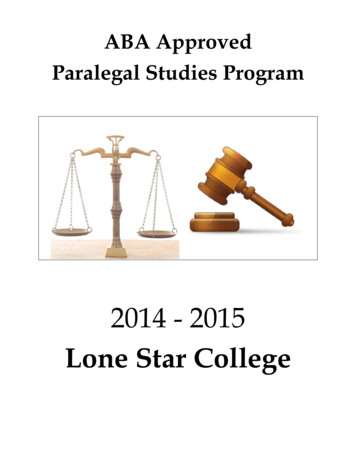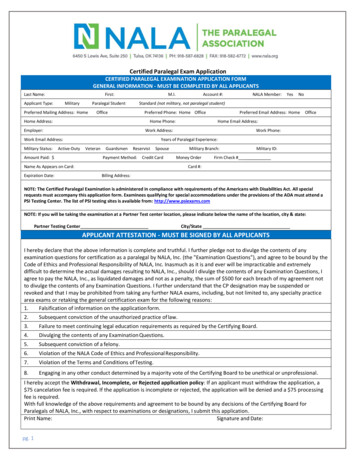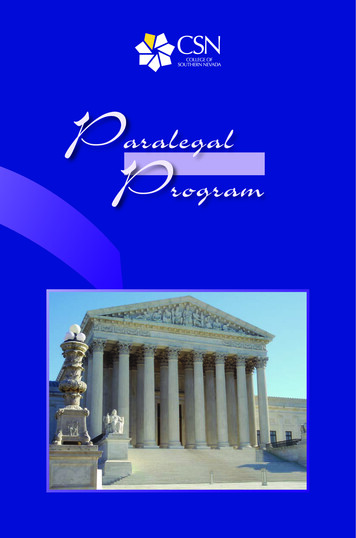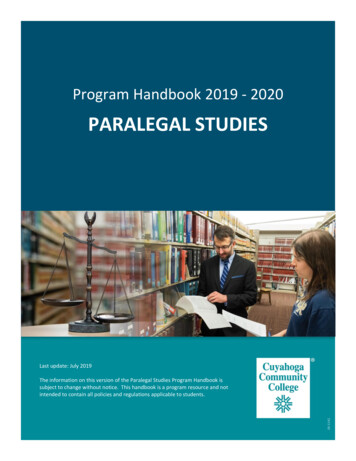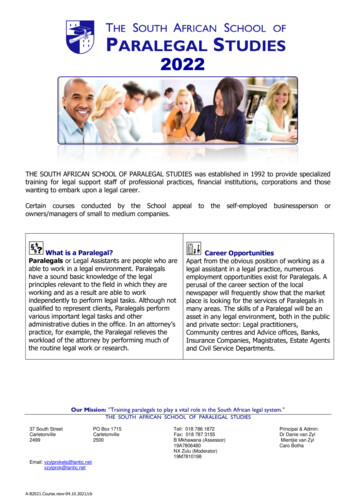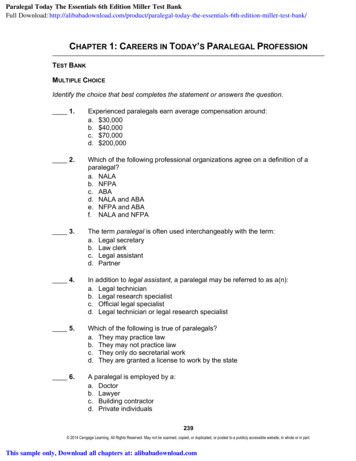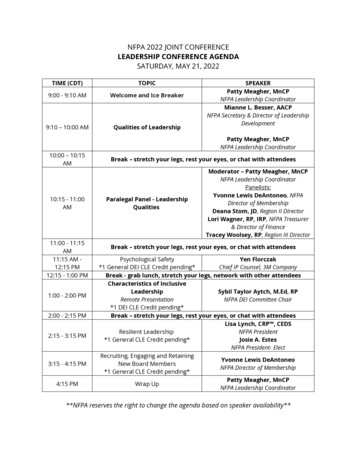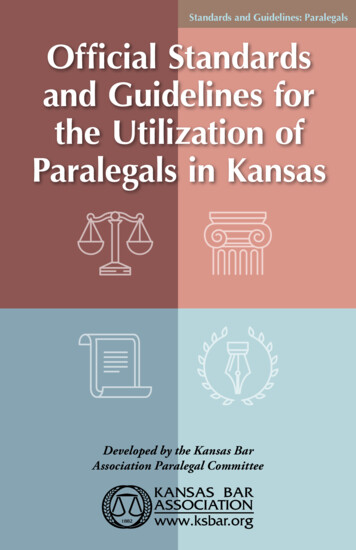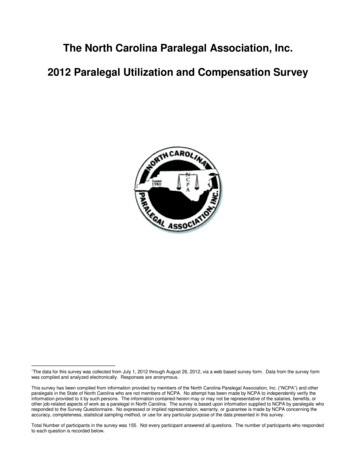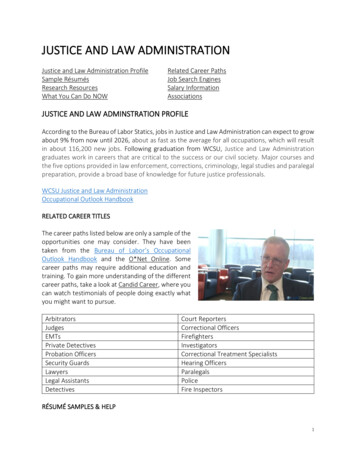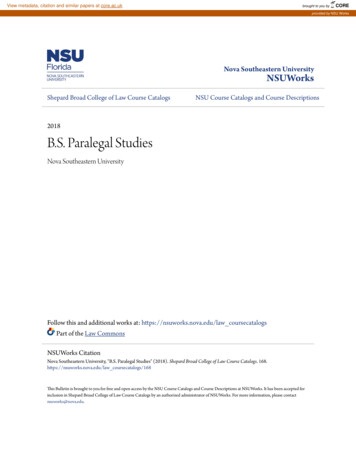
Transcription
View metadata, citation and similar papers at core.ac.ukbrought to you byCOREprovided by NSU WorksNova Southeastern UniversityNSUWorksShepard Broad College of Law Course CatalogsNSU Course Catalogs and Course Descriptions2018B.S. Paralegal StudiesNova Southeastern UniversityFollow this and additional works at: https://nsuworks.nova.edu/law coursecatalogsPart of the Law CommonsNSUWorks CitationNova Southeastern University, "B.S. Paralegal Studies" (2018). Shepard Broad College of Law Course Catalogs. 168.https://nsuworks.nova.edu/law coursecatalogs/168This Bulletin is brought to you for free and open access by the NSU Course Catalogs and Course Descriptions at NSUWorks. It has been accepted forinclusion in Shepard Broad College of Law Course Catalogs by an authorized administrator of NSUWorks. For more information, please contactnsuworks@nova.edu.
B.S. PARALEGAL StudiesBS Paralegal StudiesThe NSU Bachelor of Science in Paralegal Studies gives you a leading edge in the legalcommunity. You'll gain a comprehensive appreciation of the U.S. legal system and give you anadvantage in the highly competitive legal assistant and paralegal career field. The American BarAssociation has approved this degree program which actively prepares you to support the lawyers andlegal firms in research, trial preparation and preparing legal documents.BS Paralegal CurriculumThe goal of the NSU Law BS Paralegal Studies program is to prepare students for entry-levelparalegal positions in the common areas of law practice. Paralegals are nonlawyers, and therefore,are not authorized to practice law. Students pursuing a Bachelor of Science degree in ParalegalStudies are required to submit a paralegal portfolio at an exit interview with the program coordinatorprior to degree conferral.Program ObjectivesThe objectives of the B.S. in Paralegal Studies program are to:1. Provide students with a broad-based education in both liberal arts and paralegal studies;2. Provide paralegal courses that enable students to obtain substantive legal knowledge, developanalytical skills, and apply the knowledge they have learned to tasks routinely performed byparalegals;3. Be responsive in course offerings to the needs of paralegals and attorneys;4. Ensure that students are familiar with the ethical guidelines for paralegals;5. Provide students with the opportunity to utilize software that is used in most offices dealing withlaw-related issues;6. Familiarize students with the paralegal profession and the opportunities that are available tothem upon completion of the program.Learning OutcomesA successful Paralegal Studies graduate is expected to:1. Explain the basic theories, doctrines, concepts, and associated principles that comprise theknowledge base of law, with specific emphasis on torts, contracts, wills and trusts, civilprocedure, litigation, family law, business organizations, real estate, and criminal law;2. Use legal research and critical thinking skills to categorize, organize, prioritize, and evaluatecomplex legal issues;3. Prepare documents (e.g., memos, case briefs, correspondence, and pleadings) that meetprofessional legal standards.Curriculum RequirementsParalegal Studies (LEGS) courses offered online require proctored exams at approved sites.General Education Requirements (30 credits)
Students are required to complete 30 credit hours as part of the General Education Program.Core Courses (45 credits)LEGS 1150 - Introduction to Law and the Legal Profession (3 credits)Topics will include the structure and decisional processes of the American legal system, sources oflaw, methods of dispute resolution, the roles of the attorney and the legal assistant, legal analysis,interviewing techniques and ethics for legal assistants. This course is not required for those studentswho have taken LGST 2500.LEGS 2100 - Legal Research and Writing I (3 credits)Students will study primary and secondary sources of law, obtain legal research and writing skills,learn how to use a law library, and obtain computer-assisted legal research training.LEGS 2200 - Computer Applications for the Legal Profession (3 credits)Theory and application of programs for computers that are used in the legal profession. Hands-onexperience with microcomputers and specialized software utilized by the legal profession.LEGS 3050 - Criminal Law and Procedure (3 credits)This course covers the study of both substantive criminal law and criminal procedure for theparalegal student. Students will learn the elements of major crimes and defenses. Students also willexamine the constitutional aspects of criminal procedure, including searches, seizures and arrests;interrogation; the pretrial process; trial; sentencing; and appeal. Prerequisite: LEGS 1150 or LGST2500.LEGS 3260 - Real Estate Practice I (3 credits)Topics will include interests in real property, contracts, deeds, mortgages and other encumbrances,mortgage foreclosures, title searches, title insurance, and leases. Students will prepare closingdocuments for a residential real estate transaction. Prerequisite: LEGS 1150 or LGST 2500 or MGT2150.LEGS 3300 - Torts and Civil Litigation (3 credits)This course covers tort law, including such topics as intentional torts, negligence, strict liability,products liability, defamation, and defense to torts. Students also will examine the civil litigationprocess, including evidence, the rules of civil procedure, discovery, jury selection, and pre-trial work.Students will prepare pleadings and pre-trial discovery. Prerequisite: LEGS 1150 or LGST 2500.LEGS 3360 - Wills, Trusts, and Estates I (3 credits)Topics will include intestacy, wills, trusts, living wills, will substitutes, probate, estate administration,and estate and gift taxes. Students will prepare wills and estate administrationdocuments. Prerequisites: LEGS 1150 or LGST 2500.LEGS 3400 - Business Relations and Organizations (3 credits)Topics will include contracts (the essential elements, defenses to enforceability, thirdparty beneficiaries, and assignments), the Uniform Commercial Code, sole proprietorships, generaland limited partnerships, and corporations. Prerequisite: LEGS 1150 or LGST 2500.LEGS 3550 - Family Law (3 credits)
Topics will include prenuptial and postnuptial agreements, marriage, dissolution, equitabledistribution, alimony, shared parental responsibility, child support, property settlement agreements,adoption, and paternity and juvenile law. Prerequisite: LEGS 1150 or LGST 2500.LEGS 4110 - Legal Research and Writing II (3 credits)This course will commence with a review of all basic primary and secondary sources. Floridaresearch tools and special topical reference materials will also be covered. Advanced training incomputer-assisted legal research will be provided. Legal writing will be emphasized. There will be avariety of written work ranging from everyday correspondence to memoranda oflaw. Prerequisites: LEGS 2100 or LGST 4000.LEGS 4270 - Real Estate Practice II (3 credits)Topics will generally be chosen from among the following: title problems, mortgageforeclosures, landlord-tenants, commercial real estate transactions, condominiums, constructionliens, and environmental matters. Prerequisites: LEGS 3260.LEGS 4310 - Advanced Litigation (3 credits)This course will commence with a review of all basic primary and secondary sources. Floridaresearch tools and special topical reference materials will also be covered. The following topicsunder the Florida Rules of Civil Procedure will be covered: pleadings, service of process, parties,default, dismissals, discovery in all of its forms, the trial stage, judgments, and post-judgment relief.Students will work on civil cases in several areas of law, where they will apply many of theprocedural rules that they have studied. Prerequisites: LEGS 3300.LEGS 4370 - Wills, Trusts, and Estates II (3 credits)Topics will generally be chosen from among the following: probate litigation, mechanisms to transferproperty, will and trust drafting, homestead, and federal estate and gift tax system, the Florida estatetax, and preparation of federal estate and gift tax returns. Prerequisites: LEGS 3360.LEGS 4410 - Corporate Regulation and Change (3 credits)Topics will include the following: capitalization, debt and equity financing, federal and state securitiesregulation, mergers, asset and stock acquisitions, reorganizations, and drafting corporatedocuments. Prerequisites: LEGS 1150 or LGST 2500; and LEGS 2100 or LGST 4000; and LEGS3400.LEGS 4800 - Advanced Practicum in Paralegal Studies (3 credits)This advanced practicum simulates a law office environment in which students work for senior andjunior law partners in a generalized law practice. This experiential approach is designed to integrateand apply substantive law, procedural application and legal computer application drawing onmaterials in a variety of legal areas including but not limited to civil litigation, real estate, estateplanning, family law, legal research, criminal law, contracts and corporate law. Students take thiscourse in the last semester of their paralegal studies curriculum. Prerequisites: LEGS 2100 andLEGS 3050 and LEGS 3210 or LEGS 2200 and LEGS 3260 and LEGS 3300 and LEGS 3360 andLEGS 3400 and LEGS 3550.Major Electives (9 credits)Select 9 credits from the following courses, a maximum of 6 credits of which can be in SpecialTopics courses, and a maximum of 6 credits of which can be in Internship courses:LEGS 4050 - Advanced Practices in Criminal Law (3 credits)This course is designed to expand on the knowledge gained in the student's study of Criminal Law. Itwill review past landmark cases as well as current criminal cases faced by the courts and counsel.
The course will evaluate the criminal cases from an historical and Constitutional background toinclude the rights and procedures when charging a person with a crime, proceduralrights and protections at trial, and post-conviction rights. Students will interpret and justify legalarguments from both the prosecution and defense perspective. The course will also identify a varietyof Criminal Law issues including forensic evidence, sentencing, ethics, the death penalty, and recentcase law applied in the criminal justice system. Prerequisites: LEGS 1150 or LGST 2500; andLEGS 2100 or LGST 4000; and LEGS 3050.LEGS 4060 - Debtor and Creditor Relations (3 credits)Topics will include the following: the bankruptcy process and alternative remedies; secured partiesunder the Uniform Commercial Code; judgment liens; locating debtors' property; enforcement ofjudgments by way of garnishment, attachment, and replevin; and exemptproperty. Prerequisites: LEGS 1150 or LGST 2500.LEGS 4470 - Emerging Technologies and the Legal Profession (3 credits)This course covers emerging technologies and their impact on the legal profession. Topics coveredwill include an overview of the Internet, conducting legal research on the Internet, electronic filingwith government agencies and the courts, "non-legal" Web sites with legal-specific applications,using email in law practice, legal trends on the Internet, ethical issues pertaining to emergingtechnologies, and law as applied to computers and other technology. Prerequisites: LEGS 1150 orLGST 2500.LEGS 4560 - Elder Law (3 credits)Topics will include the following: incapacity; types of guardians; guardianship practice andprocedure; alternatives to guardianships, such as durable powers of attorney, trusts, health caresurrogates, and representatives payers; government benefits such as Social Security, Medicare, andMedicaid; and housing options such as " reverse mortgages," life care contracts, adult congregateliving facilities, and nursing homes. Prerequisites: LEGS 1150 or LGST 2500; and LEGS 2100 orLGST 4000.LEGS 4600 - Pleadings and the Courts (3 credits)This advanced course focuses on the paralegal?s role in discovery procedure and trial practice as itrelates to civil and criminal actions through a transactional approach. The course will focus on staterules of civil and criminal procedures in the drafting of legal pleadings required for each area of thelaw. Students will be involved in preparing materials for a hypothetical trial. Prerequisites: LEGS1150 or LGST 2500; and LEGS 2100 or LGST 4000.LEGS 4700 - Immigration Law (3 credits)This course provides students with a foundation in the underlying policies and basics of immigrationand nationality law. Topics include immigrant and nonimmigrant visa categories, citizenship andnationality, removal proceedings, and asylee and refugee status. Emphasis is placed on applyinglegal principles to practical situations by working on hypothetical immigration client files, includingpreparation of forms to be filed with the United States Citizenship and ImmigrationServices. Prerequisites: LEGS 1150 and LEGS 2100.LEGS 4900 - Special Topics in Paralegal Studies (3 credits)The subjects covered by this course will generally be chosen from among the following:administrative law; alternative dispute resolution; employment law; health law; immigration law;insurance law; international law; and patents, trademark, and copyright law. Prerequisites: LEGS1150 or LGST 2500; and LEGS 2100 or LGST 4000.LEGS 4950 - Internship in Paralegal Studies (3 credits)
A 20-hour per week work experience for 16 weeks in the student's major area of study at aninternship site registered with the paralegal studies program as an approved site. Consult academicdivision for specific details and requirements. Prerequisites: cumulative GPA of 2.5 or higher,completion of 36 or more credit hours, and permission of paralegal coordinator. Students may take amaximum of two internships, which must be taken at different internship sites.B.S. Paralegal - MinorPursuing a minor can deepen your knowledge in a discipline related to your major or enable you toexplore a field outside your major area of study and diversify your skills. Don't hesitate to speak witha faculty member in your program to determine which minor(s) can support your academic,professional, and personal goals. All MinorsUndergraduate MinorsPursuing a minor can deepen your knowledge in a discipline related to your major or enable you toexplore a field outside your major area of study and diversify your skills. Speak with a facultymember in your program to determine which minor(s) can support your academic, professional, andpersonal goals. Contact your academic advisor to enroll in a minor.The following undergraduate minors are offered by the College of Arts, Humanities, and SocialSciences: African Diaspora StudiesAnthropologyArts AdministrationCommunicationDanceDigital Media ProductionEnglishFilm StudiesFolklore and MythologyGender StudiesGraphic DesignHistoryHumanitiesInternational Law International StudiesIrish StudiesJournalismLatin American and Caribbean StudiesLegal StudiesMedical HumanitiesMusicPhilosophySociologySpanish
Strategic CommunicationStudio ArtTheatreWritingThe Paralegal Studies minor at the College of Law is designed to expose students to the mostcommon areas of law encountered in a legal and business context. While not approved by theAmerican Bar Association this minor is an enhancement for those students pursuing other lawrelated careers or business careers and who desire to understand the federal and state legalsystems to broaden their legal knowledge and skills. This minor can be combined with any majorand minor except the Paralegal Studies major and Paralegal Studies post-baccalaureate certificate.Paralegal Studies Minor Requirements(18 credits)Legal Studies (LEGS) courses offered online require proctored exams at approved sites.Core Courses (6 credits)LEGS 1150 - Introduction to Law and the Legal Profession (3 credits)Topics will include the structure and decisional processes of the American legal system, sources oflaw, methods of dispute resolution, the roles of the attorney and the legal assistant, legal analysis,interviewing techniques and ethics for legal assistants. This course is not required for those studentswho have taken LGST 2500.LEGS 2100 - Legal Research and Writing (3 credits)Students will study primary and secondary sources of law, obtain legal research and writing skills,learn how to use a law library, and obtain computer-assisted legal research training.Minor Electives (12 credits)Select 12 credits from the following courses:LEGS 3050 - Criminal Law and Procedure (3 credits)This course covers the study of both substantive criminal law and criminal procedure for theparalegal student. Students will learn the elements of major crimes and defenses. Students also willexamine the constitutional aspects of criminal procedure, including searches, seizures and arrests;interrogation; the pretrial process; trial; sentencing; and appeal. Prerequisite: LEGS 1150 or LGST2500.LEGS 3260 - Real Estate Practice I (3 credits)Topics will include interests in real property, contracts, deeds, mortgages and other encumbrances,mortgage foreclosures, title searches, title insurance, and leases. Students will prepare closingdocuments for a residential real estate transaction. Prerequisite: LEGS 1150 or LGST 2500 or MGT2150.LEGS 3300 - Torts and Civil Litigation (3 credits)This course covers tort law, including such topics as intentional torts, negligence, strict liability,products liability, defamation, and defense to torts. Students also will examine the civil litigation
process, including evidence, the rules of civil procedure, discovery, jury selection, and pre-trial work.Students will prepare pleadings and pre-trial discovery. Prerequisite: LEGS 1150 or LGST 2500.LEGS 3360 - Wills, Trusts, and Estates I (3 credits)Topics will include intestacy, wills, trusts, living wills, will substitutes, probate, estate administration,and estate and gift taxes. Students will prepare wills and estate administrationdocuments. Prerequisites: LEGS 1150 or LGST 2500.LEGS 3400 - Business Relations and Organizations (3 credits)Topics will include contracts (the essential elements, defenses to enforceability, thirdparty beneficiaries, and assignments), the Uniform Commercial Code, sole proprietorships, generaland limited partnerships, and corporations. Prerequisite: LEGS 1150 or LGST 2500.LEGS 3550 - Family Law (3 credits)Topics will include prenuptial and postnuptial agreements, marriage, dissolution, equitabledistribution, alimony, shared parental responsibility, child support, property settlement agreements,adoption, and paternity and juvenile law. Prerequisite: LEGS 1150 or LGST 2500.Paralegal Studies Post-Baccalaureate CertificateAfter clicking Apply Now, your choice should be: "Choose a New Graduate Account"The NSU Law Paralegal Studies Post-Baccalaureate Certificate program gives you the edge in thehighly demanding engaging career as a paralegal with attorney offices throughout the U.S. Theprogram directs your talents and focus toward assisting public and private sector attorneys inpreparing for hearing, trials, and maintaining positive communication with clients.The focused curriculum concentrates on the skills needed to become a working professional in thehigh-demand paralegal role for law firms. The coursework is highly experiential, emphasizingexercises, case studies, and real-world course content to help students master the key paralegalfunctions and better understand the profession of law. Offered through the Shepard Broad College ofLaw, the faculty include full-time professors, lawyers, judges, and magistrates who have demonstratedboth top-notch teaching ability and expertise in their subject matter.The American Bar Association approved track combines both live classroom courses and onlinecourses. An alternative track provides the same coursework in an all online version. (The onlineversion is not approved by the American Bar Association.)Courses are generally offered in the evenings, enabling students to complete the program in less thanone year.Current NSU students pursuing a non-paralegal studies undergraduate degree can concurrentlyregister for the certificate.Certification RequirementsThe Paralegal Certificate is available to any student who has successfully completed anundergraduate (BS or BA) degree. The paralegal profession is highly demanding and requires itsprofessionals to have a strong commitment to their clients, lawyers, and the legal system.
Students are required to complete 30 credits of Paralegal Studies courses. Upon successfulcompletion of the coursework, students are required to submit a paralegal portfolio at an exitinterview with the program coordinator prior to certificate conferral.Paralegal Studies (LEGS) courses offered online require proctored exams at approved sites. TheAmerican Bar Association requires that a minimum of 10 credits of coursework be taken in atraditional, ground-based format (i.e., not online).Students admitted to the Paralegal Studies Post-Baccalaureate Certificate program may transfer upto 12 credits of "legal specialty" courses taken at an American Bar Association approved program. Acourse considered for transfer must have been taken no longer than five years prior to entry into theParalegal Studies Post-Baccalaureate Certificate program, must be substantially similar to anexisting NSU paralegal studies course, must have been passed with a grade of "C" or higher, andmust be approved by the paralegal studies program coordinator.Certificate Course Requirements (30 credits)LEGS 1150 - Introduction to Law and the Legal Profession (3 credits)Topics will include the structure and decisional processes of the American legal system, sources oflaw, methods of dispute resolution, the roles of the attorney and the legal assistant, legal analysis,interviewing techniques and ethics for legal assistants. This course is not required for those studentswho have taken LGST 2500.LEGS 2100 - Legal Research and Writing (3 credits)Students will study primary and secondary sources of law, obtain legal research and writing skills,learn how to use a law library, and obtain computer-assisted legal research training.LEGS 2200 - Computer Applications for the Legal Profession (3 credits)Theory and application of programs for computers that are used in the legal profession. Hands-onexperience with microcomputers and specialized software utilized by the legal profession.LEGS 3050 - Criminal Law and Procedure (3 credits)This course covers the study of both substantive criminal law and criminal procedure for theparalegal student. Students will learn the elements of major crimes and defenses. Students also willexamine the constitutional aspects of criminal procedure, including searches, seizures and arrests;interrogation; the pretrial process; trial; sentencing; and appeal. Prerequisite: LEGS 1150 or LGST2500.LEGS 3260 - Real Estate Practice I (3 credits)Topics will include interests in real property, contracts, deeds, mortgages and other encumbrances,mortgage foreclosures, title searches, title insurance, and leases. Students will prepare closingdocuments for a residential real estate transaction. Prerequisite: LEGS 1150 or LGST 2500 or MGT2150.LEGS 3300 - Torts and Civil Litigation (3 credits)This course covers tort law, including such topics as intentional torts, negligence, strict liability,products liability, defamation, and defense to torts. Students also will examine the civil litigationprocess, including evidence, the rules of civil procedure, discovery, jury selection, and pre-trial work.Students will prepare pleadings and pre-trial discovery. Prerequisite: LEGS 1150 or LGST 2500.LEGS 3360 - Wills, Trusts, and Estates I (3 credits)
Topics will include intestacy, wills, trusts, living wills, will substitutes, probate, estate administration,and estate and gift taxes. Students will prepare wills and estate administrationdocuments. Prerequisites: LEGS 1150 or LGST 2500.LEGS 3400 - Business Relations and Organizations (3 credits)Topics will include contracts (the essential elements, defenses to enforceability, thirdparty beneficiaries, and assignments), the Uniform Commercial Code, sole proprietorships, generaland limited partnerships, and corporations. Prerequisite: LEGS 1150 or LGST 2500.LEGS 3550 - Family Law (3 credits)Topics will include prenuptial and postnuptial agreements, marriage, dissolution, equitabledistribution, alimony, shared parental responsibility, child support, property settlement agreements,adoption, and paternity and juvenile law. Prerequisite: LEGS 1150 or LGST 2500.Any 4000-level LEGS course (3 credits)Tuition and FeesNSU Law Paralegal Certificate Program Tuition Information2018-2019 ESTIMATED EXPENSES (EFFECTIVE JULY 1, 2018)Full-Time Students(4 or more credithours)Part-Time Students(3 or fewer credithours)Application Fee (non-refundable) 50 50Student Services Fee 450 225Paralegal Certificate Program 755/credit hour 755/credit hourRegistration Fee (per term) 30 30Application Degree Fee 100 100Cap and Gown (if attendingcommencement ceremony)Specialist Regaliapricing informationSpecialist Regaliapricing information
Payment is due when registration is completed. If payment is not received 30 daysafter start of term, the student will be assessed a late fee. If payment is not receivedby the end of the term, the student will not be allowed to register for the next termor view final grades. Please visit the Bursar's website for more information onpayments.Financial Aid is available for those who qualify. Students may apply for financialassistance or view additional information about financial assistance by going tothe NSU Student Financial Assistance Website.A student must remain in good standing with the Bursar's Office. If the student'saccount is not clear of charges before a registration period begins, the student willnot be permitted to register for classes.Tuition and Student Service Fees do not cover the cost of textbooks. Textbookprice will vary from term to term, with some professors not requiring anytextbooks; however, it is fair to estimate a few hundred dollars per term to coverthe cost of textbooks.Disclaimer: Tuition and fees are subject to change.Paralegal ABA informationA paralegal, as defined by the American Bar Association, is "a person, qualified by education, trainingor work experience, who is employed or retained by a lawyer, law office, corporation, governmentalagency, or other entity, and who performs specifically delegated substantive legal work for which alawyer is responsible." The goal of the program is to prepare students for entry-level paralegalpositions in the common areas of law practice. Paralegals are non-lawyers and therefore are prohibitedfrom the unauthorized practice of law. This program trains paralegals and is not a program for traininglawyers or legal administrators.Nova Southeastern UniversityPost baccalaureate certificate in Paralegal Studies PostBaccalaureate CertificateProgram Length: 69 weeksPrintStudents graduating on timeN/A* of Title IV students complete the program within 69 weeks*Fewer than 10 students enrolled in this program. This number has been withheld to preserve theconfidentiality of the students.
Program Costs* 19,347 for tuition and fees 1,176 for books and suppliesOther CostsVisit website for more program cost information*The amounts shown above include costs for the entire program, assuming normal time tocompletion.Note that this information is subject to change.Students Borrowing MoneyThe typical graduate leaves withN/A* in debt*Fewer than 10 students completed this program within normal time. This number has been withheldto preserve the confidentiality of the students.The typical monthly loan paymentN/A* per month in student loans with an interest rate of N/A*.*Fewer than 10 students completed this program within normal time. This number has been withheldto preserve the confidentiality of the students.Graduates who got jobsN/A* of program graduates got jobs*We are not currently required to calculate a job placement rate for program completers.Program graduates are employed in the following fields:Paralegals and Legal AssistantsLicensure RequirementsThe following do not have licensure requirements for this profession:FloridaAdditional InformationDate Created 3/16/2018These disclosures are required by the U.S. Department of Education
The objectives of the B.S. in Paralegal Studies program are to: 1. Provide students with a broad-based education in both liberal arts and paralegal studies; 2. Provide paralegal courses that enable students to obtain substantive legal knowledge, develop analytical skills, and apply the knowledge they have learned to tasks routinely performed by
